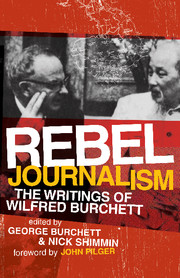Book contents
- Frontmatter
- Contents
- List of Photographs
- Acknowledgements
- Foreword by John Pilger
- Foreword by Gavan McCormack
- Introduction
- 1 The Atomic Plague [1945]
- 2 With Mick Griffith to the Plaine des Lacs [1941]
- 3 Who is Wingate Anyway? [1944]
- 4 The Trial of Cardinal Mindszenty [1951]
- 5 Liberty in Eastern Europe [1951]
- 6 The Microbe War [1953]
- 7 Koje Unscreened [1953]
- 8 The Ball-Point Pen Murders [1954]
- 9 South of the 17th Parallel [1955]
- 10 Front-Line Village [1959]
- 11 Welcome Home [1961]
- 12 Gagarin: The First Interview with Western Journalists [1961]
- 13 Virgin Lands [1962]
- 14 Lilac and Outer Space [1962]
- 15 War Against Trees [1963]
- 16 The Tragedy of South Vietnam's Ethnic Minorities [1964]
- 17 Interview with General Vo Nguyen Giap (April 13, 1964)
- 18 A Fortified Hamlet [1965]
- 19 Patriots & Mercenaries [1965]
- 20 At Ground Level [1966]
- 21 A Spurned Olive Branch [1967/1977]
- 22 Personal Leader [1968]
- 23 The Tet of Peace [1973/1977]
- 24 ‘Something from Nothing’ Township [1976]
- 25 Evaluating the Past [1976]
- 26 Mercenaries: British Export Model [1977]
- 27 The Geneva Conference [1978]
- 28 How to be a Good Khmer Rouge [1981]
- 29 China Prepares to Attack Vietnam [1981]
- 30 Afterword [1983]
- Notes
- Bibliography
- Index
12 - Gagarin: The First Interview with Western Journalists [1961]
Published online by Cambridge University Press: 22 September 2009
- Frontmatter
- Contents
- List of Photographs
- Acknowledgements
- Foreword by John Pilger
- Foreword by Gavan McCormack
- Introduction
- 1 The Atomic Plague [1945]
- 2 With Mick Griffith to the Plaine des Lacs [1941]
- 3 Who is Wingate Anyway? [1944]
- 4 The Trial of Cardinal Mindszenty [1951]
- 5 Liberty in Eastern Europe [1951]
- 6 The Microbe War [1953]
- 7 Koje Unscreened [1953]
- 8 The Ball-Point Pen Murders [1954]
- 9 South of the 17th Parallel [1955]
- 10 Front-Line Village [1959]
- 11 Welcome Home [1961]
- 12 Gagarin: The First Interview with Western Journalists [1961]
- 13 Virgin Lands [1962]
- 14 Lilac and Outer Space [1962]
- 15 War Against Trees [1963]
- 16 The Tragedy of South Vietnam's Ethnic Minorities [1964]
- 17 Interview with General Vo Nguyen Giap (April 13, 1964)
- 18 A Fortified Hamlet [1965]
- 19 Patriots & Mercenaries [1965]
- 20 At Ground Level [1966]
- 21 A Spurned Olive Branch [1967/1977]
- 22 Personal Leader [1968]
- 23 The Tet of Peace [1973/1977]
- 24 ‘Something from Nothing’ Township [1976]
- 25 Evaluating the Past [1976]
- 26 Mercenaries: British Export Model [1977]
- 27 The Geneva Conference [1978]
- 28 How to be a Good Khmer Rouge [1981]
- 29 China Prepares to Attack Vietnam [1981]
- 30 Afterword [1983]
- Notes
- Bibliography
- Index
Summary
With he and Purdy being the only Western journalists permitted to meet Gagarin, the following interview was one of Burchett's great scoops. Gagarin's achievement was inevitably the biggest story in the world, and readers everywhere wanted to know more about him and his flight.
He was born in Klushino on 9 March 1934, to parents who worked on a collective farm, although his mother was reportedly a voracious reader and his father a skilled carpenter. In 1955, after completing his technical schooling, he entered military flight training at the Orenburg Pilot's School, and was subsequently assigned to Luostari Airbase in Murmansk Oblast, close to the Norwegian border. In 1960, after an extensive search and selection process Gagarin was chosen with 19 other cosmonauts for the Soviet space program. Out of the twenty selected, Gagarin and Gherman Titov were eventually chosen for the first launch due to their excellent performance in training, as well as their physical characteristics – fully grown, Gagarin was 5 ft 2 in (1.57 m) tall, which was an advantage in the small Vostok cockpit. Burchett later also published a book about Titov.
It was on 12 April 1961 that Yuri Gagarin became the first human to travel into space in Vostok 1. While in orbit Gagarin was promoted ‘in the field’ from the rank of Senior Lieutenant to Major, and this was the rank given in the triumphant TASS announcement during the flight. Once safely returned, Gagarin issued a statement praising the Communist Party of the Soviet Union as the ‘organiser of all our victories’. After the flight, Gagarin became an instant, worldwide celebrity, touring widely with appearances in Italy, Germany, Canada and Japan to promote the Soviet achievement.
- Type
- Chapter
- Information
- Rebel JournalismThe Writings of Wilfred Burchett, pp. 124 - 129Publisher: Cambridge University PressPrint publication year: 2007



